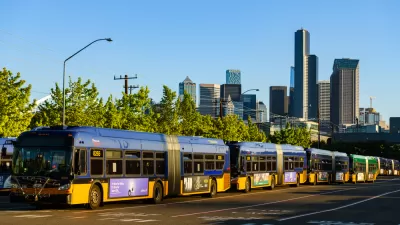The agency cites the high cost of the program and a county code that bars restroom facilities from transit centers as reasons for ending the six-month pilot.

King County Metro plans to remove two public restroom facilities at its transit centers, despite what The Urbanist’s Ryan Packer calls “promising results.”
As Packer explains, “Central Puget Sound has a dearth of public restrooms, particularly at transit facilities, with the few available often accessible for limited hours and many riders dependent on nearby private businesses for restroom access.” The six-month pilot was designed to explore options to expand restroom access.
“However, the pilot program’s high costs, mostly associated with providing 24-hour security to both transit centers to monitor the restrooms, will likely prove the biggest deterrent to making them permanent.” The program cost $568,567 to operate — with roughly 70 percent spent on security personnel.
Councilmember Rod Dembowski, who championed the project, said hiring 24/7 security may have been ‘overkill.’ Dembowski added, “There’s a long history in Seattle with struggling with public restrooms, they can be costly, difficult to maintain, but I think for the usability of our system and the riders, I think it’s something we ought to continue to work on.”
FULL STORY: King County Plans to Close Transit Center Restrooms Despite Promising Pilot

Alabama: Trump Terminates Settlements for Black Communities Harmed By Raw Sewage
Trump deemed the landmark civil rights agreement “illegal DEI and environmental justice policy.”

Study: Maui’s Plan to Convert Vacation Rentals to Long-Term Housing Could Cause Nearly $1 Billion Economic Loss
The plan would reduce visitor accommodation by 25% resulting in 1,900 jobs lost.

Planetizen Federal Action Tracker
A weekly monitor of how Trump’s orders and actions are impacting planners and planning in America.

Wind Energy on the Rise Despite Federal Policy Reversal
The Trump administration is revoking federal support for renewable energy, but demand for new projects continues unabated.

Passengers Flock to Caltrain After Electrification
The new electric trains are running faster and more reliably, leading to strong ridership growth on the Bay Area rail system.

Texas Churches Rally Behind ‘Yes in God’s Back Yard’ Legislation
Religious leaders want the state to reduce zoning regulations to streamline leasing church-owned land to housing developers.
Urban Design for Planners 1: Software Tools
This six-course series explores essential urban design concepts using open source software and equips planners with the tools they need to participate fully in the urban design process.
Planning for Universal Design
Learn the tools for implementing Universal Design in planning regulations.
Caltrans
Smith Gee Studio
Institute for Housing and Urban Development Studies (IHS)
City of Grandview
Harvard GSD Executive Education
Toledo-Lucas County Plan Commissions
Salt Lake City
NYU Wagner Graduate School of Public Service





























